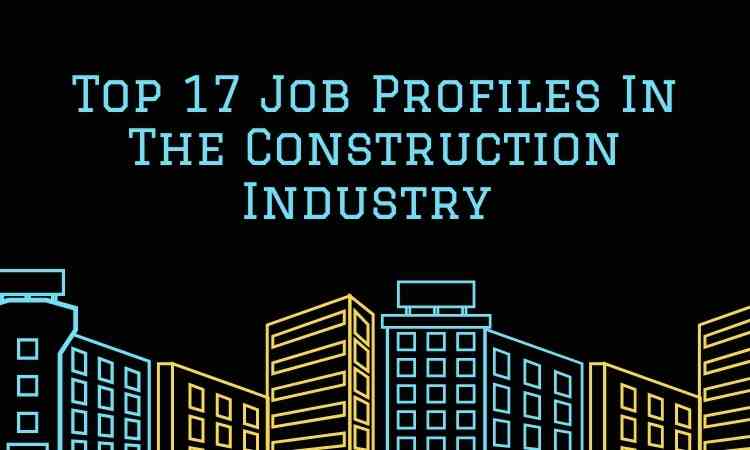Last Updated on June 5, 2024 by Admin
From Civil engineering to structural engineering, construction is a massive sector with many job roles. Construction could be the industry if you’re a practical person interested in knowing how things work. We have listed below the best job profiles in the construction industry to kick-start your career in construction. Here are the best jobs in the construction industry to look for in 2024.
Types of Jobs in the Construction Industry
The Construction Industry is one of the biggest industries after agriculture worldwide and one of the most prominent employment creators globally.
The construction industry is broadly divided into the Construction of buildings, Heavy and civil engineering construction, and Specialty trade contractor.
It is an amalgamation of various other types of construction companies, so there are hundreds of Job profiles in the entire construction industry.
We have compiled the list of the Construction Job titles & descriptions used in the construction industry.
- Residential Building.
- Institutional and Commercial Building.
- Specialized Industrial Construction.
- Infrastructure and Heavy Construction.
Most Essential eBook to Ace Your Civil Engineering and Construction Job Interview;
- Construction Jobs Interview: An Ultimate Interview Preparation Guide Ebook
- Construction Management Job Interview Guide + 200 Interview Q&A PDF eBook
- An Ultimate Guide to Launch Your Career in Digital Construction: Ebook
- BIM Job Interview Preparation Guide + 210 Interview Questions and Answers PDF eBook
Top Jobs In the Construction Industry
Here are the best jobs within the construction industry. The various positions in the construction field for civil and other engineers.
Learn more about the construction job roles and responsibilities, the jobs in the construction industry list, construction industry profiles, jobs in a construction company, Job posts in a construction company, and the various profiles under the construction sector.
As per our study, we found the following are the best in-demand jobs in the construction industry;
1. Architect

An architect plans, designs, and oversees the construction of buildings. To practice architecture means providing services in connection with the design and construction of buildings and the space within site surrounding the buildings that have human occupancy or use as their principal purpose.
Etymologically, architect derives from the Latin architects, which derives from the Greek (arkhi-, chief + tekton, builder), i.e., chief builder.
Professionally, an architect’s decisions affect public safety, and thus an architect must undergo specialized training consisting of advanced education and an internship) for practical experience to earn a license to practice architecture. Practical, technical, and academic requirements for becoming an architect vary by jurisdiction.
2. BIM Coordinator

Building information modeling (BIM) involves generating and managing digital representations of the physical and functional characteristics of places.
Building information models (BIMs) are files (often but not always in proprietary formats containing proprietary data) that can be extracted, exchanged, or networked to support decision-making regarding a building or other built asset.
Individuals use current BIM software, businesses, and government agencies that plan, design, construct, operate and maintain diverse physical infrastructures, such as water, refuse, electricity, gas, communication utilities, roads, bridges, ports, tunnels, etc.
Related Posts
- Ace Your BIM Interview: BIM Job Interview Preparation Guide + 210 Interview Questions and Answers eBook
- Civil Engineering Fresher Jobs, Various Sectors to Find Jobs in 2024?
- The Great Construction Career – A Career Blueprint
- Construction Management Career & A Complete Guide for 2024
- Construction Job Titles and Descriptions In The Construction Industry
3. Project Controller

Project controls are the data gathering, management, and analytical processes used to predict, understand, and constructively influence a project’s time and cost outcomes by communicating information in formats that assist effective management and decision-making.
This definition encompasses all stages of a project or program’s lifecycle, from the initial estimating needed to ‘size’ a proposed project through reflective learning (lessons learned) and the forensic analysis needed to understand the causes of failure (and develop claims).
Consequently, the project controls discipline can be seen as encompassing:
- Project strategy, undertaking planning, and methods studies to help Project management optimize future outcomes
- Scheduling, including development, updating, and maintenance
- Cost estimation cost engineering/control and value engineering
- Risk management, including maintaining the risk register and risk analysis/assessment
- Earned Value Management and Earned Schedule, including WBS, OBS, and other breakdown structures,
- Document control
Forensic Assessment for required diagnosis of schedule and cost
Supplier performance measurement/oversight (but excluding contract administration); - The elements of a project management methodology that integrate these disciplines both within the ‘controls’ domain and with other project management functions
Project control encompasses the people, processes, and tools used to plan, manage, and mitigate cost and schedule issues and any risk events that may impact a project.
In other words, Project control is essentially equivalent to the project management process stripped of its facilitating sub-processes for safety, quality, organizational, behavioral, and communications management.
eBook to Ace Your Civil Engineering and Construction Job Interview;
- A Comprehensive Civil Engineering Job Interview Guide with 300 Interview Questions and Answers PDF eBook.
- BIM Job Interview Preparation Guide + 210 Interview Questions and Answers PDF eBook
- Construction Project Coordinator Job Interview Guide + 200 Interview Q&A PDF eBook
- Interview Guide & 150 Construction Project Management Interview Questions & Answers eBook
4. Surveyor

Surveying or land surveying is the technique, profession, and science of determining the terrestrial or three-dimensional position of points and distances and angles.
A land surveying professional is called a land surveyor. These points are usually on the surface of the Earth, and they are often used to establish land maps and boundaries for ownership, locations like building corners or the surface location of subsurface features, or other purposes required by government or civil law such as property sales.
Surveyors work with elements of geometry, trigonometry, regression analysis, physics, engineering, metrology, programming languages, and the law. They use total stations, robotic stations, GPS receivers, retro-reflectors, 3D scanners, radios, handheld tablets, digital levels, drones, GIS, and surveying software.
Surveying has been an element in developing the human environment since recorded history began.
The planning and execution of most forms of construction require it. It is also used in transport, communications, mapping, and defining legal boundaries for land ownership. It is an essential tool for research in many other scientific disciplines.
5. CAD Technician

As a CAD or computer-aided design technician, you’ll use software to create design plans for buildings and machinery. You could work in various industries, from engineering and construction to manufacturing.
You could work in 2D design, known as surface modeling, or 3D design – called solid modeling.
Initially, you’ll use surface modeling to draw a balanced representation of the product, for example, a new building design.
Clients will then see the plans and give feedback before engineers build and test a prototype. You’ll create a 3D display of a structure or component in solid modeling.
Engineers could then use this to take a ‘virtual tour’ around the inside of a new building, for example, to plan where to fit electrical cabling. Or they may ‘look inside’ a piece of manufacturing machinery to see where advancement could be made.
You can also use your designs to help organize cost estimates on projects and product assembly instructions, and maintenance manuals for installation, service, and repair technicians. You will typically work in a small team, with each technician working on a different part of a project under the guidance of a design engineer.
Note that CAD work may have different names depending on the industry, including:
- Computer-aided industrial design (CAID)
- Computer-aided engineering (CAE)
- Computer-aided styling (CAS)
- Computer-aided manufacturing (CAM)
Related Posts:
- Top Construction Management Online Courses To Study In 2024
- What Is The Difference Between Civil Engineering and Architecture?
- Construction jobs Interview: An Ultimate Interview Preparation Guide (Ebook)
- Ebook on Building Information Modeling (BIM): An Ultimate Career Guide
- Civil Engineering Technical Questions and Answers Pdf eBook
6. Construction Manager

Construction managers are often the primary catalysts in construction projects. They are responsible for construction sites 24 hours a day.
Typical duties of construction managers include planning, directing, and coordinating activity on construction sites, overseeing project design, hiring and supervising workers, choosing contractors, and monitoring supplies.
They are also responsible for preparing budgets and estimates, reporting progress to clients, and to fulfill legal requirements. Construction managers do not typically do any of the actual construction.
Related Posts:
- Top 50 HR Interview Questions and Answers for Engineers
- Best Civil Engineering Software Updated List 2024
- What Is The Difference Between Civil Engineering and Architecture?
- Contracts Manager Job Description and Salary Details
- Civil Engineering Subjects & Civil Engineering Syllabus For BE, B.Tech Course
- Effective Job Search Strategies for Engineers
7. Contracts Manager

Construction contract managers help to win building contracts. They also help to control costs and keep construction projects on track. Projects can include everything from commercial and residential developments to road and rail engineering works.
If you’re good with numbers and IT and can pay close attention to detail, you could find a career as a construction contract manager very rewarding. To do this job, you will need experience in the construction industry, although you may be able to get in if you have a background in contracting and managing projects in other sectors.
8. Commercial Manager

Commercial management is the non-technical business discipline within a company or organization, particularly the administration of revenue and expenses to generate a financial return. Its origins appear to go back to the defense and construction industries in the United Kingdom in the 1590s.
Commercial management within an organization is applied only at policy levels. Commercial policies relate to the rules or practices that define how a business will be conducted and the standard terms under which external relationships will be conducted.
Many of these policies are reflected in any contract the organization engages in. At a transactional level, commercial management is applied through the oversight of trading relationships to ensure their conformity with business goals or policies and to understand or manage any variations’ financial and risk implications.
Revit Courses:
- Virtual Building Design for Engineers Using Autodesk Revit
- Autodesk Certified Professional: Revit for Architectural Design Exam Prep
- Autodesk Certified Professional: Revit for Structural Design Exam Prep
- BIM Application for Engineers
- Exploring the Role of Structural Design in Civil Engineering: A Comprehensive Guide
- 3D Architectural Design and Modeling with Revit
9. Design Engineer

Design engineers research and develop ideas for new products and the systems used to make them. They also work to improve the performance and efficiency of existing products.
If you want a professional career in engineering and are good at problem-solving and generating new ideas, this job could suit you well.
In this job, you must be able to use computer-aided design software. You will need to be able to combine engineering and design principles.
10. Site Engineer / Site Manager

A civil site engineer will manage part of a construction project; they also help with technical advice and supervise other staff members. The work can be varied as projects can range from working on a large-scale housing estate to building a new shopping complex. Site engineers should understand the different needs projects have.
Key tasks of the job include:
- Managing parts of construction projects
- Overseeing building work
- Undertaking surveys
- Setting out sites and organizing facilities
- Supervising contracted staff
- Ensuring projects meet agreed specifications, budgets, or timescales
- Liaising with clients, subcontractors, and other professional staff
- Checking and preparing site reports, designs, and drawings
- Providing technical advice
- Problem-solving
- Ordering and negotiating the price of materials
- Ensuring site safety
11. Estimation and Costing Engineer

Estimators work out how much it will cost to supply products and services to their clients.
If you have a good head for facts and figures, like being part of a team, and want a varied job, this might be a career to suit you.
To do this job well, you’ll need excellent maths and digital skills, work with a high degree of accuracy, and an organized approach.
You can become a junior estimator and work your way up if you have a good general standard of education. Another option is to take a college or university course that covers some of the skills needed to do the job and then apply for work afterward.
Related Courses:
- Modern Building Design
- Industrial Internet of Things (IIoT)
- Digital Twins
- Top Construction courses for 2024 on Udemy
12. Health & Safety Professional

As a health and safety adviser or officer, you would use your knowledge and skills to reduce workplace injuries, accidents, and health problems. If you have an eye for detail and love problem solving, this could be the ideal job for you.
You will need to be able to apply your communication skills when writing reports or dealing with employers. You’ll also be expected to have a good knowledge of health and safety legislation.
Most health and safety advisers get into this role by either completing a qualification and then looking for work or studying while working. It is becoming more common for advisers to enter this profession with degree-level stuff.
13. Planner / Planning Engineer

The planning engineer generally carried out the following tasks/operations.
- Prepare and update the project schedule based on the contract.
- Set the work program and target milestones for each phase based on the project plan.
- Monitor critical activities based on the project schedule and advise project management. Prepares and
- Submit updated work program and cash flow curve showing actual progress and identify areas of
- Weakness and establish means and methods for recovery, if any, and new critical activities.
- Monitor day-to-day work progress and prepare the weekly and monthly program and report.
- Maintain and record updates of site work progress obtained from the Project Manager.
- Prepares monthly reports reflecting the work progress summary. Report to the Project Manager about the
- Current work progress and compare the plan and actual progress and study impact of alternative approaches to work.
- Participate in project meetings and discussions with the Client as required.
- Assists in preparing work programs, cash flow, and manpower histogram for tenders.
- Performs other duties and responsibilities as may be assigned from time to time.
Related Courses:
- Transportation, Sustainable Buildings, Green Construction
- The Construction Industry: The Way Forward
- Smart Urban Green Infrastructure
- Digital Manufacturing & Design
14. Project Engineer

Project Engineer bridges the boundaries between engineering and project management, leading the technical workers who contribute to building structures or products.
In some cases, the project engineer is the same as a project manager, but in most cases, these two professionals have joint responsibility for leading a project. Project management holds the responsibility of every field of engineers
15. Project Manager

A project manager is a professional in the field of project management. Project managers are responsible for the planning, procurement, and execution of a project, in any engineering domain.
Project managers are the first point of contact for any issues or discrepancies arising from within the heads of various departments before the problem escalates to higher authorities.
Project management is the responsibility of a project manager. This individual seldom participates directly in the activities that produce the result but instead strives to maintain the progress, mutual interaction, and tasks of various parties to reduce the risk of overall failure, maximize benefits, and minimize costs.
Related Courses:
- Digital Transformation and Industry 4.0 Masterclass
- Blockchain Evolution and Technology Concepts
- Construction Equipment Types And Construction Equipment List
- Application of AI, InsurTech, and Real Estate Technology
- People, Technology and the Future of Mobility
16. Quantity Surveyor

A quantity surveyor (QS) is a professional working within the construction industry concerned with construction costs and contracts. One of the best jobs in the construction industry. Services provided by a quantity surveyor may include:
- Cost planning and commercial management throughout the entire life-cycle of the project from inception to post-completion
- Value engineering
- Risk management and calculation
- Procurement advice and assistance during the tendering procedures
- Tender analysis and agreement of the contract sum
- Commercial management and contract administration
- Assistance in dispute resolution
- Asset capitalization
- Interim valuations and payment assessment
- Cost management process
- Assessing the additional costs of design variations
- Production of company pre-qualification questionnaire (PQQ) documentation aligned with company policies.
17. Structural Engineer

Structural engineers analyze, design, plan, and structural research components and structural systems to achieve design goals and ensure the safety and comfort of users or occupants. Their work mainly considers safety, technical, economic, and environmental concerns, but they may also consider aesthetic and social factors.
Structural engineering is usually considered a specialty discipline within civil engineering, but it can also be studied in its own right. In the United States, most practicing structural engineers are currently licensed as civil engineers, but the situation varies from state to state. Some states have a separate license for structural engineers, which must design unique or high-risk structures such as schools, hospitals, or skyscrapers.
Typical structures designed by a structural engineer include buildings, towers, stadia, and bridges. A structural engineer may also design other structures such as oil rigs, space satellites, aircraft, and ships.
Most structural engineers are employed in the construction industry; however, there are also structural engineers in the aerospace, automobile, and shipbuilding industries.
A structural engineer works closely with architects, civil engineers, mechanical engineers, electrical engineers, quantity surveyors, and construction managers in the construction industry.
Related Courses:
- The Construction Industry: The Way Forward
- Safety in the Utility Industry
- Creative Architectural Design & Modeling in Revit
- Free Basic BIM Training : Introduction To BIM
- Oil & Gas Industry Operations and Markets
Final Reflections
The construction industry offers diverse career opportunities, including a vacancy in construction company for fresher, which is an excellent starting point for individuals looking to break into this field. This list of construction jobs titles is extensive, encompassing various roles from skilled labor to management positions. A typical entry-level role is a job in construction site supervisor, where individuals oversee the daily operations on a construction site, ensuring that projects are completed efficiently and safely.
When considering Different Types of Construction Jobs? There’s a wide range, from manual labor roles to technical and administrative positions. Construction consultant jobs involve expert advice on construction projects, often requiring specialized knowledge in project management, cost estimation, and legal compliance.
Private construction jobs typically refer to positions within privately owned construction firms, as opposed to public or government-run projects. The careers in construction span a wide array, offering opportunities for growth and development in various areas. Career options in construction are diverse, ranging from hands-on building and craft jobs to design, engineering, and management roles. Similarly, construction and trades careers offer a pathway into skilled trades like carpentry, electrical work, and plumbing.
Among these, best construction jobs often refer to roles that offer a combination of good pay, job security, and opportunities for advancement. The top jobs in construction are usually those that require specialized skills or leadership roles in project management and engineering. The highest-paying construction careers often include project managers, BIM Managers, civil engineers, and architects, reflecting the level of expertise and responsibility associated with these roles.
Jobs in construction industry in India are growing, with the country’s rapid urbanization and infrastructure development creating numerous opportunities. “\Construction jobs with high demand include roles in project management, site engineering, and sustainable building practices. The Fastest growing careers in construction industry are often those linked with evolving technology, such as green construction and digital project management.
Civil construction company jobs cater to large-scale infrastructure projects like roads, bridges, and public works, requiring specialized engineering and management skills. Jobs in construction industry for freshers provide entry-level opportunities in various domains, from site supervision to administrative support. The most popular types of construction jobs tend to be those with steady demand and the potential for career growth, such as electricians, plumbers, and site managers.
Job roles in construction careers vary greatly, offering positions for people with different skills and interests, whether in hands-on building, design, management, or supporting roles. Jobs in construction industry salary ranges widely based on factors like job role, experience, and geographic location, with skilled trades and management roles often commanding higher wages.
Suppose you are a civil Engineer, Structural Engineer, or Architect and want to explore career opportunities in construction. Kindly get into any of the above-listed best and top jobs in the construction industry to make your career more rewarding.
FAQs
The pinnacle position in a construction company is typically that of a ‘Chief Executive Officer’ (CEO) or ‘President’. This individual is responsible for overseeing all operations, making major corporate decisions, managing the overall resources and operations, and acting as the main point of communication between the board of directors and corporate operations.
The construction industry is a broad field that includes the planning, design, financing, and execution of infrastructure projects. This encompasses residential, commercial, and industrial building construction, as well as large-scale infrastructure projects like highways, bridges, and public buildings.
Construction jobs are diverse, ranging from hands-on work to management and planning. Key roles include construction managers, civil engineers, architects, surveyors, electricians, plumbers, carpenters, and laborers. Each role requires specific skills and contributes uniquely to the project’s completion.
Technological advancements significantly impact the construction industry by improving efficiency, safety, and cost-effectiveness. Innovations like building information modeling (BIM), drones, 3D printing, and automation in construction processes are revolutionizing how projects are planned, executed, and managed.
Major challenges include managing the rising costs of materials and labor, adhering to increasingly stringent environmental and safety regulations, addressing the skilled labor shortage, and keeping pace with technological advancements. Effective management and adoption of new technologies are crucial in addressing these challenges.


